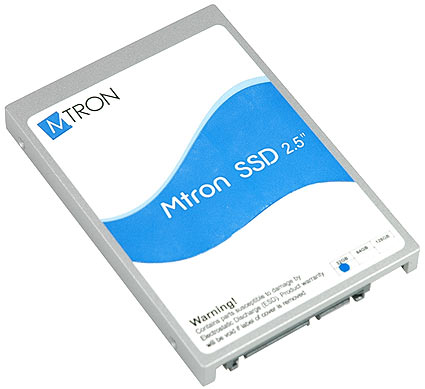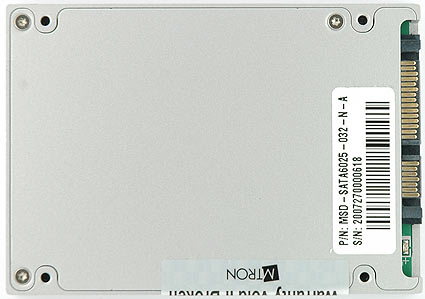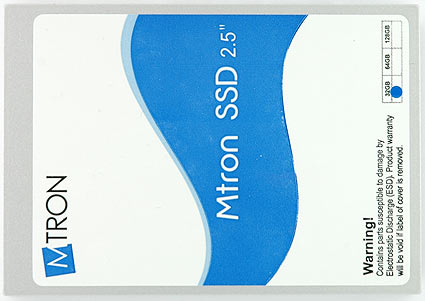Mtron SSD 32 GB: Performance with a Catch
Mtron SSD 2.5" - 32 GB
At a weight of 114 g and a power consumption of 2.0 to 2.9 W, the Mtron devices are as heavy as a conventional 2.5" notebook hard drive, and they are equally energy-hungry. This could be a first indicator for a new performance champion, because efficiency usually isn't on the specification for high-end products. From the perspective of desktop PCs, the weight and power consumption is irrelevant, as any 3.5" hard drive will be several times heavier and consume two to five times the power.
The box indicates that there will be 64 GB and 128 GB versions; we received two of the 32 GB drives. Given that the initial prices of the 32 GB model were approximately $1,500, we expect the 64 GB model to be many times more expensive. The 128 GB version is scheduled for 2008. A few thousand dollars for a Flash SDD really only make sense for the notebook of a TOP500 company's executive or if you simply don't know where else to spend your money. Everyone who is looking for a fast system hard drive should go for a more affordable capacity version for the operating system and add a mechanical hard drive for data storage.
The drive comes in a sleek aluminum body and utilizes a SATA/150 interface. The maximum throughput we measured was 94.5 MB/s, which is less than Mtron's promised 100 MB/s. However, our default Promise FastTrak TX4310 controller isn't the fastest device available. At the time we started using this device, the performance differences between various drives were smaller, so it wasn't obvious that the controller could be a limiting factor one day. Using an nForce 680i SLI's SATA port, we actually reached 100.2 MB/s and almost 100 MB/s sequential read speed. We've been testing all storage devices using this controller, so you can compare the performance results to all the other drives in our 3.5" Hard Drive Charts or 2.5" Notebook Hard Drive Charts. Since all drives were tested on the same hardware, the results are still accurate.
Back to the performance numbers: The Mtron 32 GB SSD shows access times of less than 0.1 ms, which is excellent. The transfer rate of 94.5 MB/s is available at all times, while every conventional hard drive will deliver decreasing performance as you occupy the entire storage capacity and the inner, slower sectors of the rotating platters have to be used.
The Mtron device completed the PCMark05 HDD benchmarks with excellent results: a single drive provides better performance at the Windows XP startup benchmark and the file write benchmark than a RAID 0 that consists of two SanDisk SSD5000 Flash SSDs. A quick test with Photoshop (time to open a complex psd file) also returned excellent results: 5.4 seconds vs. 6 seconds for the SanDisk drive vs. 9.3 seconds for a WD1500 Raptor.
This is also the first Flash SSD, which is capable of beating the pants off one of the fastest mechanical SATA hard drivess, the Western Digital Raptor at its 10,000 RPM. As you can see in the benchmarks, SanDisk's SSD5000 could not even come close to the Raptor's I/O performance. Mtron's new device, however, delivers several hundred I/O operations per second in the file server, database and workstation patterns, and it delivers almost 5,000 I/Os in webserver environments, where multiple small files have to be retrieved. Clearly, a single Mtron 32 GB 2.5" SSD delivers I/O performance that is at least several times better than what the WD Raptor can do. Clearly, all servers with storage bottlenecks can benefit tremendously from such a drive - if the available capacities don't become an issue.
Putting two Mtron 32 GB SSDs into a RAID 0 setup did not exactly double the performance, but it brought an increase to 173-142 MB/s read throughput and 149 to 113 MB/s write throughput. These are excellent results, but we expected them to be slightly better. When we tried to reproduce performance issues with Intel ICH8 and ICH9 Southbridge chips reported by AnandTech, we hit the same limitations: The throughput was limited to 80 MB/s on various different platforms. We did not find these limitations with ATI/AMD or Nvidia chipsets, though.
Get Tom's Hardware's best news and in-depth reviews, straight to your inbox.
Current page: Mtron SSD 2.5" - 32 GB
Prev Page 2.5" Vs. 3.5" - Desktop Vs. Notebook - HDD Vs. RAM Vs. Flash Next Page Flash SSD Comparison Table
Patrick Schmid was the editor-in-chief for Tom's Hardware from 2005 to 2006. He wrote numerous articles on a wide range of hardware topics, including storage, CPUs, and system builds.


